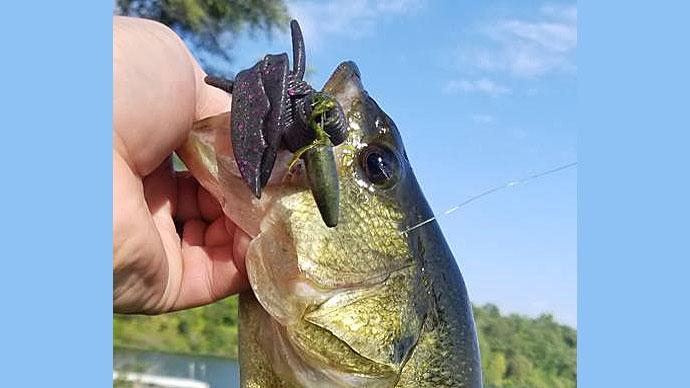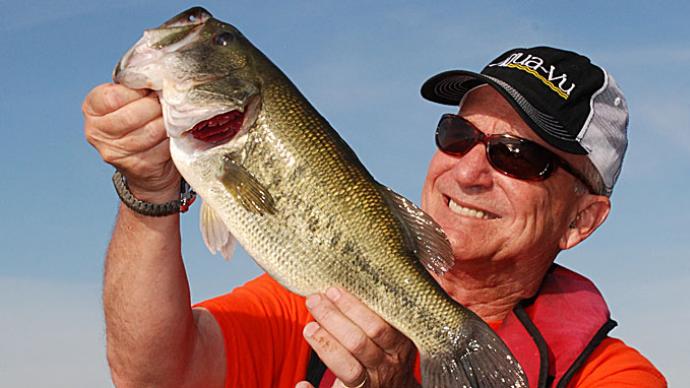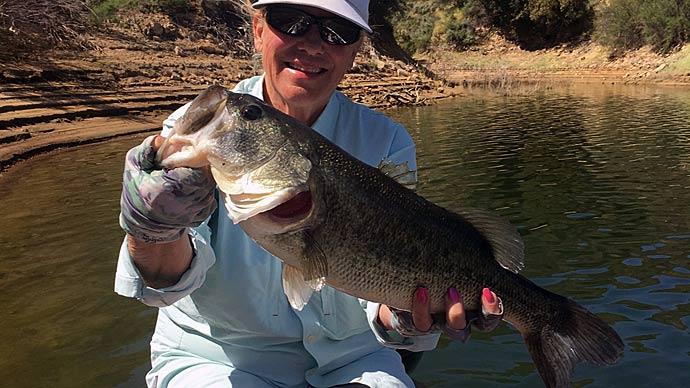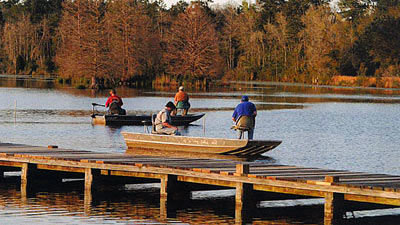
Maybe I should start a fishing club. Has that thought crossed your mind? If so, let's paddle a little deeper into that cove and see what's under the water.
In the late 1980s and into the 90s, as I tried to find my niche as a private-sector fisheries biologist, several fishing club clients were in my work portfolio. They weren't as fun to work with as private landowners, as it was tough to keep them happy. As my career molded, I realized that my personality and work ethic were more conducive to working with one decision-maker per project. Unfortunately, fishing clubs often have lots of decision-makers.
Plus, I believe in the sign hanging blissfully behind B.A.S.S. founder Ray Scott's desk. "If it ain't fun, we don't do it."
It's hard to hit goals if said goals are moving targets. As the governing board changes, so do the goals. So, purposefully, I drifted away from fishing clubs as management clients.
That doesn't change the question, however. If you are thinking about starting a fishing club, it isn't what you know that hurts. It's what you have yet to learn.
In theory, we can look at some numbers that make intriguing sense. For example, say you have 300+ acres of land, a nice 30-acre lake, with several smaller bodies of water that are fun to fish on any given day.
In your mind's eye, if you had 50 members paying $1,500 yearly, you'd have an annual income of $75,000.
Yes, you would.
What would it cost?
There are several types of clubs. We've written about several on these pages. Remember Steve Alexander's Private Water Fishing, based in Dallas, Texas? He leases lakes from landowners, takes care of all bookings, and absorbs the liability with a hefty insurance policy. His members pay dues, then pay again each time they grace a property with their fishing presence. Alexander sends the landowner a tidy check every time there's a booking.
Then, there are those people who offer up their land as a lease to private individuals and work with the lessees like many hunting ranches do.
There are other types of fishing clubs. One type is where the club is its own entity; each member is an owner of the club and its assets. A small, blue-collar hunting and fishing club is not far from our home base in north Texas. The club is a corporation. The corporation owns the land, building, and assets. Members own a share of stock. When someone decides to be a member no longer, they sell their share back to the club, which sells it to the next member at their discretion. The land has one nice-sized lake and seven smaller ponds. The whole property covers 350 acres. They manage the lakes for good fishing and appreciate the rest of the land for its ability to attract game birds, especially doves and migratory waterfowl. Annual dues for that club are $175. That's it—one hundred seventy-five bucks. Period. But there are 175 members. They are famous for their lack of use. Maybe ten people are active enough to be considered regular users. Oh, another critical point is that this club is more than 90 years old and has its own mineral rights. Those five or six oil field pump jacks keep the coffers full for that club. Nice perk.
Then, there are those more elitist-type clubs where people of means escape the confines of the city for the trappings of soothing waters teeming with wildlife. One such club has a forty-year waiting list. Members are famous for passing their memberships to the next of kin. Next of kin is famous for keeping that cherished membership in the family. Those clubs may have a startup capital initiation fee well into six digits, with annual dues more than the median income of us average Americans.
What separates these different clubs?
Quite a bit, but they all have some things in common.
First, clubs convey some ownership. The corporate clubs convey ownership of the club, and the club owns the property. Others convey ownership of rights to use the property and to improve it.
If you are considering starting a fishing club, figure out what level of ownership you plan to yield. When you accept money into a club, expect members to buy into your ownership.
The best news? You get to decide what that ownership level is. Then, your prospective members get to decide if the value is there for what they want.
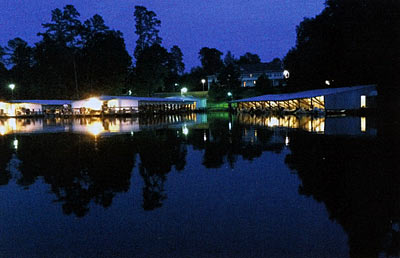
That blue-collar club? Expectations aren't very high. When they hold their annual meeting, it's almost like a dinner on the grounds of the local Baptist church. Everyone brings a covered dish, eats heartily, catches up on everyone's lives, talks about the good old days, and then they go home. That other club? They have a staff, starting with a full-time caretaker. That caretaker is married to the full-time chef. And these clubs often have housekeepers and handymen to ensure everything gets done. That way, when the members come, they can play rather than fix broken boards on the dock, charge batteries, or deal with stopped-up plumbing.
Each fishing club has a set of rules, usually in the form of by-laws. When new members sign up, they must sign both a waiver of liability and a letter acknowledging receipt and understanding of said by-laws. In the membership contract, written in legalese, a member concedes expulsion if these rules are broken.
If you want a fishing club, have by-laws to protect yourself and your members.
Be prepared to have a significant liability insurance policy. People get hurt or do something stupid and get hurt.
We have yet to talk about the fishing part, have we?
What rights will you give up? Access to the property? Fishing rights? Can your members bring guests? Does the member have to be present when their guests come? What about bringing a travel trailer or building a cabin? Who improves the fishery? Who makes the fishing rules—you or the membership board of directors? Do you want the members to govern themselves, with the by-laws as their guide? Who chooses new members?
As you can see, there are a lot of things to decide. And, for the sake of stress-free times and not having to buy stock in the company that makes Mylanta, decide all this stuff way before forming your club and taking anyone's money.
Speaking of money, what do those dollars buy for the member? That circles back to their rights—and yours. You now realize how much money makes this endeavor worth the effort.
Can members bring boats? You'll need rules.
Will you need a caretaker, or will that be you?
Here's the following tidbit of advice. Find several fishing clubs; call them and see if you can meet to see facilities and learn about how the club's business is structured. Compare several clubs, look at their by-laws, and listen to the decision-makers. Having an audience with the club manager or caretaker is also a good idea. Ask about the pros and cons.
Back in 2005, I was working with Dr. Jim Morgan and his right-hand man, Dave Buhler. They were struggling with what to do with their prime lake, Richmond Mill Lake. That 125-acre, 170+-year-old mill pond not far from Southern Pines, North Carolina, was amidst a significant dam renovation, and Morgan and Buhler were trying to figure out the best business model to fit their style and bank account.
I'll always remember setting up a tour for them to investigate five different fishing clubs in east Texas. Each one was legendary on its own merits. Each had its own style of management, and its own similar set of by-laws, with different rules, based on the need of the era. But, what they all had in common was a membership that expected certain rights, mainly their own. And, if something didn't happen as they expected within those rights, they'd let you know quickly.
That story points to the need to establish a chain of command inside your by-laws. Define member qualifications and expectations. Be sure to have a way to say adios to a problem member, and keep yourself far away from harmful conflict.
We still haven't talked about fishing.
That's the fun part—after you decide who manages the lake, who takes care of it, and who's accountable for ensuring the experiences are as promised.
Can a fishing club be effective? Absolutely. If not, there wouldn't be so many of them or so many with a decade or longer waiting list. But, unfortunately, those clubs are not without strife, especially when there's discord between membership and the governing body.
Some of the most fun I've personally had was working on membership club lakes and helping mold members into better stewards of their water. What wasn't fun was dealing with a board of directors that tended to change agendas every three years as members left and new ones joined. I spent a lot of time trying to work with and teach new members how a fishery works and explain to them what we'd done for the last number of years to get the lake where it was at that point.
We still haven't talked about fishing, have we?
Are you sure you want to look at starting a fishing club? If you've muddled your way through this article and it still seems like a good idea, then take the next step. Visit some clubs, bring a list of questions, and get some answers. Then, you'll have the first step of due diligence done. After that, think about your ideas, blend the by-laws and design the best business model you can. Next, look at the numbers and see if they make sense. Finally, compare the membership fees you desire, see if the money makes sense, and look at the next step.
Compare all that information to your situation, your lake, and your amenities.
After you do that, joining a club and fishing might make more sense.
Just don't fall out of the boat.
Reprinted with permission from Pond Boss Magazine


